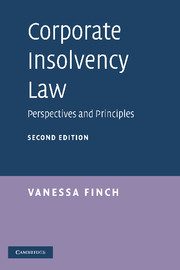Book contents
- Frontmatter
- Contents
- Acknowledgements
- Table of cases
- Table of statutes and other instruments
- List of abbreviations
- Introduction to the second edition
- PART I Agendas and objectives
- PART II The context of corporate insolvency law: financial and institutional
- PART III The quest for turnaround
- 6 Rescue
- 7 Informal rescue
- 8 Receivers and their role
- 9 Administration
- 10 Pre-packaged administrations
- 11 Company arrangements
- 12 Rethinking rescue
- PART IV Gathering and distributing the assets
- PART V The impact of corporate insolvency
- 18 Conclusion
- Bibliography
- Index
8 - Receivers and their role
Published online by Cambridge University Press: 05 June 2012
- Frontmatter
- Contents
- Acknowledgements
- Table of cases
- Table of statutes and other instruments
- List of abbreviations
- Introduction to the second edition
- PART I Agendas and objectives
- PART II The context of corporate insolvency law: financial and institutional
- PART III The quest for turnaround
- 6 Rescue
- 7 Informal rescue
- 8 Receivers and their role
- 9 Administration
- 10 Pre-packaged administrations
- 11 Company arrangements
- 12 Rethinking rescue
- PART IV Gathering and distributing the assets
- PART V The impact of corporate insolvency
- 18 Conclusion
- Bibliography
- Index
Summary
A first legally structured insolvency procedure with some potential for rescue to be considered here is receivership. It follows from the earlier chapters that an appraisal of receivership should go further than offering an outline of powers and duties and should analyse the role and conception of receivership as it operates. This chapter, accordingly, will look at receivership as a process as well as an institution. The laws, procedures and actors involved in receivership will be examined and the benchmarks of efficiency, expertise, accountability and fairness will be employed in asking whether receivership plays an acceptable role in insolvency as a whole. The part played by receivers in rescues will be a focus here, but attention will also be paid to ongoing corporate operations and the impact of receivership on these.
At this stage it might be objected that administrative receivership has largely been abolished and so does not need to be examined here – that the Enterprise Act 2002 took away the floating charge holder's right to appoint an administrative receiver and, in doing so, largely replaced receivership with administration. It is true that the 2002 Act restricted the use of administrative receivership but receivership is not dead yet. Creditors with ‘qualifying’ floating charges that were created before the 2002 Act, or those with charges which, though created after that date, fall within one of the specified exceptions may still appoint administrative receivers. ‘Ordinary’ receivers, moreover, can still be appointed by the courts and debenture holders.
- Type
- Chapter
- Information
- Corporate Insolvency LawPerspectives and Principles, pp. 327 - 362Publisher: Cambridge University PressPrint publication year: 2009



